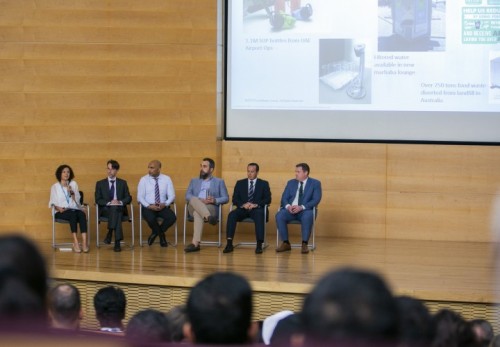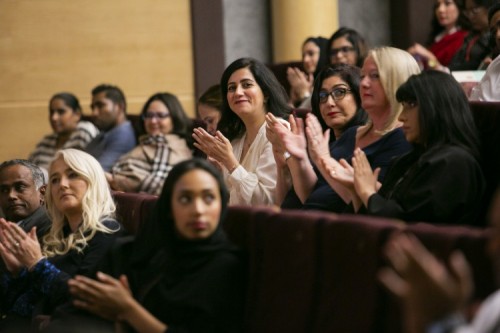Emirates Group Hosts Sustainability Panel To Engage Employees On World Wildlife Day

Championing environmental stewardship and providing an opportunity for employees to understand the role that the company plays in building a more sustainable future, the Emirates Group hosted an event to raise awareness of the role of business in environmental protection and to highlight its ongoing environmental initiatives in conjunction with World Wildlife Day.
The event began with a screening of the popular Netflix documentary, Our Planet: Our Business. The Group’s environmental sustainability framework, was briefly introduced, along with its three focus areas: reducing emissions, consuming responsibly and preserving wildlife and habitats. This was followed by an overview and panel discussion from different departments including Emirates Environment Affairs, dnata Environment, Service Delivery and Emirates Flight Catering on some of their environmental goals, ongoing initiatives, challenges and long-term sustainability plans. The audience was also able to ask the panel questions.
As part of the airline’s long-term sustainability initiatives, Emirates set out to significantly reduce its consumption of single use plastics in June 2019. Since then, over 100 million pieces of single use plastics have been removed from its aircraft. The airline has been working to reduce its use of items such as salt and pepper covers, plastic menu bags, as well as plastic wrapping for toys, and close to 15 million pieces of plastic have been removed from these three items. Emirates has also replaced amenity kit bag contents, child meal cutlery, stirrers and swizzle sticks, straws and waste bags with eco-friendly alternatives, eliminating close to 90 million plastic items from Emirates flights last year.
On the ground, over 1.1 million single use plastic bottles have been removed from Emirates’ and dnata’s ground operations and replaced with eco-friendly alternatives for employees to use. Moving away from bottled water options, marhaba lounges will also begin providing customers with filtered water, helping reduce waste to landfill even further for the millions of customers who frequent the lounges every year. A series of measures have also helped to divert over 250 tonnes of food waste produced at dnata catering from landfills in Australia. Initiatives include food waste being broken down to wastewater and released to the waste water system. In addition, excess food is being donated to charities who provide meals for people in need in both Australia and the UK.
Emirates Flight Catering (EKFC) produces an average of over 200,000 meals per day, and some of its biggest sustainability initiatives include food waste projects. In an effort to use the whole product, close to 500 kilogrammes of food items, including fruits, vegetables, bakery items and meat, are saved each day to be used in small goods, or are reused for different purposes in EKFC’s retail operations.
Srdan Susic, Director of Conservation and Climate at Emirates Nature-WWF also joined the panel to talk about the importance of making changes now, preserving vital ecosystems in the UAE, how the environment will affect businesses in the future and what can be done, and that small changes do make a difference.





